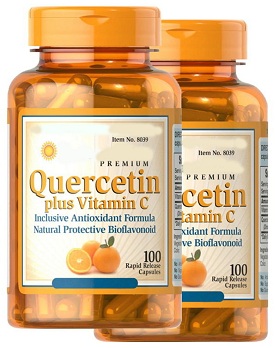BREAKING! Supplements For COVID-19: Quercetin Emerging As An Adjuvant For COVID-19 Treatments
Source: Supplements For COVID-19 Aug 13, 2020 5 years, 5 months, 2 weeks, 3 days, 3 hours, 45 minutes ago
Supplements For COVID-19:
Quercetin-a common plant based supplement is being viewed by some as a potential adjunct therapy for patients with COVID-19. Medical professionals who support the use of the supplement say it could be one part of a treatment regimen along with interventions like remdesivir or convalescent plasma, and that its over-the-counter availability and relatively good safety profile serve as advantages.

Quercetin is a pigment found in many fruits, vegetables, and plants. Quercetin belongs to a family of bioflavonoids, responsible for the bright colours and medicinal properties of many plants. You can get Quercetin through a balanced diet or as a food supplement. Foods and drinks that contain Quercetin include berries, apples, citrus fruits, kale, tomatoes, onions, buckwheat, red wine, and black tea. It is also found in herbal remedies, such as ginkgo biloba and St John's wort. Quercetin can be taken as a supplement in addition to other products. It can act as an antioxidant, neutralising free radicals that cause cellular and DNA damage. Quercetin is known for its antibacterial and anti-inflammation properties, ability to prevent neurological diseases, and lower high blood pressure.
Significantly it has been found that quercetin promotes SIRT2, which then inhibits the NLRP3 inflammasome assembly involved with COVID-19 infection, said Dr Samuel F. Yanuck, DC, of the Program on Integrative Medicine at the University of North Carolina Chapel Hill School of Medicine, who co-authored a review of emerging research on the subject. It also plays a role in facilitating zinc transportation across lipid membranes, Dr Yanuck said.
https://imjournal.com/oa/evidence_supporting-a_phased_immuno-physiological_approach_to_covid-19_from_prevention_through_recovery/
Dr Yanuck told Thailand Medical News, "It's not a bizarre or experimental substance and given it has these potential important biological roles, I think it's worth being considered as part of an overall strategy. Quercetin would need to be one part of a multifactorial treatment regimen.”
It was found that in cell cultures, quercetin has been shown to prevent viral entry and reduce the cytopathic effects of many viruses, including rhinovirus and poliovirus. In a 2016 animal study, rodents administered quercetin before being exposed to a lethal load of Ebola virus survived.
https://www.ncbi.nlm.nih.gov/pmc/articles/PMC4997876/
Significantly, COVID-19 has been associated with high levels of interleukin-6, depleted levels of interferons, and a cytokine storm that damages the body and is related to respiratory failure, said Dr Ruben Colunga Biancatelli, MD, of Old Dominion University in Norfolk, Virginia, and first author of a paper on quercetin and vitamin C as a potential therapy for treating SARS-CoV-2 in
Frontiers in Immunology. https://www.frontiersin.org/articles/10
.3389/fimmu.2020.01451/full
Researchers are also suggesting that vitamin C should be administered with quercetin because it can recycle oxidized quercetin, producing a synergistic effect and enhancing quercetin's antiviral capability.
Interestingly during the 2003 SARS outbreak, Chinese researchers found that quercetin bound to the spike protein of the virus, interfering with its ability to replicate and infect host cells.
https://pubmed.ncbi.nlm.nih.gov/15452254/
Dr Hasan Önal, MD from Kanuni Sultan Suleyman Training and Research Hospital in Turkey is now recruiting participants for an open-label
randomized control trial in Turkey examining quercetin's role in COVID-19. In the trial, 95 patients with COVID-19 will be receiving a 1,000-mg active treatment dose and 113 healthcare workers will be receiving a 500-mg dose as prophylaxis.
https://clinicaltrials.gov/ct2/show/NCT04377789
Dr Önal's team drew on a lone hospital practice guidance from Eastern Virginia Medical School in Norfolk, Virginia, written by Dr Paul E. Marik, MD, chief of pulmonary and critical care medicine there. Dr Marik included quercetin in the institution's COVID-19 management protocol for prophylaxis and mild to moderate cases.
https://www.evms.edu/media/evms_public/departments/internal_medicine/Marik-Covid-Protocol-Summary.pdf
Dr Marik commented, "It's based on good, basic science and there are some really interesting papers postulating it's benefit, but unfortunately we don't have any clinical data. If you have something that is potentially beneficial, safe, and cheap, what do you have to lose?
Dr David M. Aronoff, MD, of Vanderbilt University in Nashville, Tennessee said that given the antiviral activity that has been demonstrated in preclinical data, it would be reasonable to prescribe quercetin in the context of a properly designed clinical trial for treating COVID-19.
Meanwhile a team of Canadian researchers is placing their hopes on Quercetin as an antiviral itself. The research is led by Dr Michael Chrétien, a scientist at the Clinical Research Institute of Montreal along with Dr Majambu Mbikay, Congolese scientist, to conduct clinical trials on the drug in China and find out if it will test against the novel coronavirus. Dr Chrétien defines Quercetin a "broad-spectrum antiviral" that has shown to be effective against SARS, the Ebola virus, and the Zika virus.
They are basing their hopes on 2019 study by Korean scientists that showed that Quercetin and other flavonoids might inhibit the proteolytic activity of SARS-CoV 3C-like protease and therefore cause the antiviral effect.
https://www.tandfonline.com/doi/full/10.1080/14756366.2019.1690480
Quercetin can act as a nutritional stimulator of Sirtuin function and inhibit mTOR activity. It means that it challenges the replication of the virus. As Quercetin is poorly absorbed, it is best to start taking it as a supplement long before exposure, so it has time to accumulate. Additionally, Quercetin has good safety profiles and causes an anti-inflammatory effect.
https://www.researchgate.net/publication/234009588_Inhibition_of_mTOR_Signaling_by_Quercetin_in_Cancer_Treatment_and_Prevention and
https://www.hindawi.com/journals/omcl/2016/2986796/
Dr Chrétien and Dr Mbikay, researchers from the Clinical Research Institute of Montreal (IRCM), also believe that that pre-treatment with Quercetin, rather than post-treatment, brought the most reliable protection and that it also offered prophylactic protection based on a previous study.
https://aac.asm.org/content/60/9/5182 and
https://www.ncbi.nlm.nih.gov/pmc/articles/PMC7289229/
To date they are lots of other studies that show the benefits of Quercetin as an antiviral, as an anti- inflammatory agent and for the treatment of various respiratory diseases and viral disease and even as a prophylaxis against certain diseases
https://www.sciencedirect.com/science/article/pii/S1043661810001064 and
https://pubmed.ncbi.nlm.nih.gov/31251771/
For more on
Supplements For COVID-19, keep on logging to Thailand Medical News.
